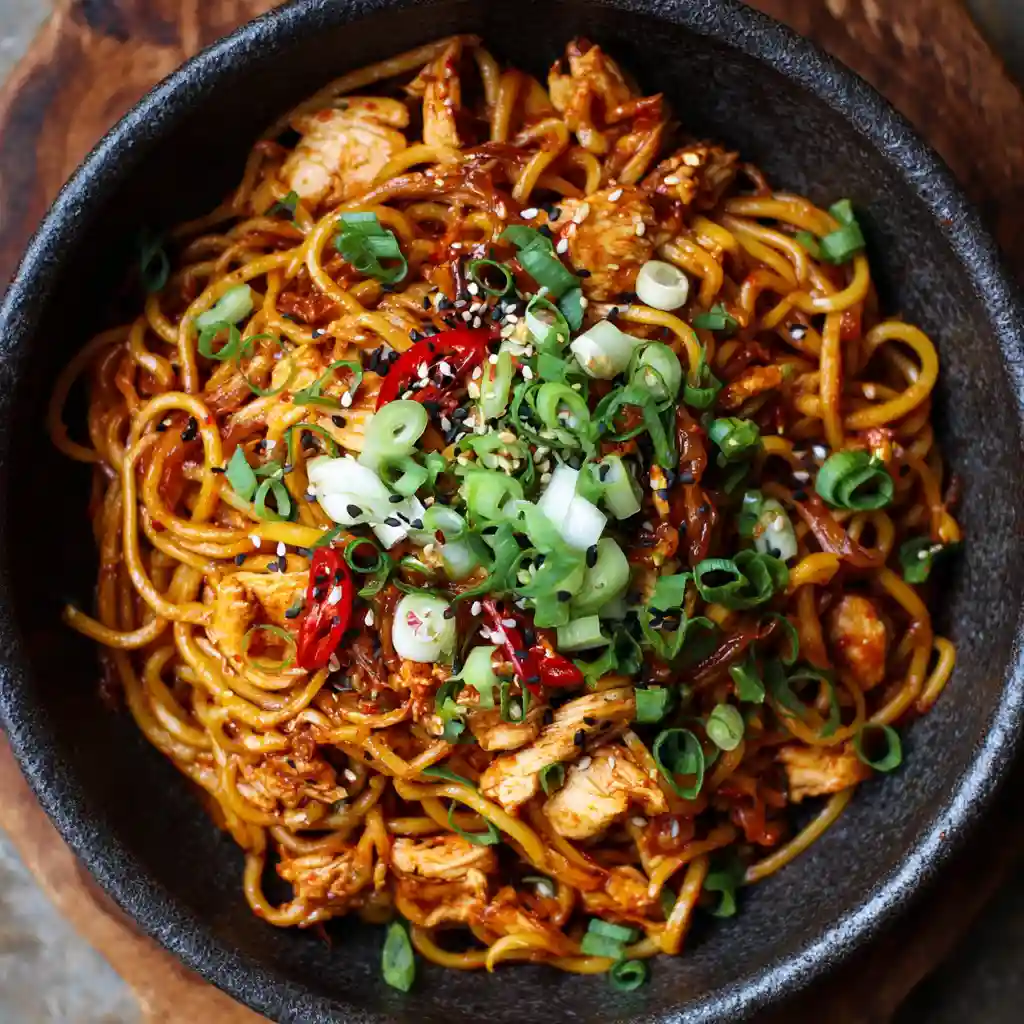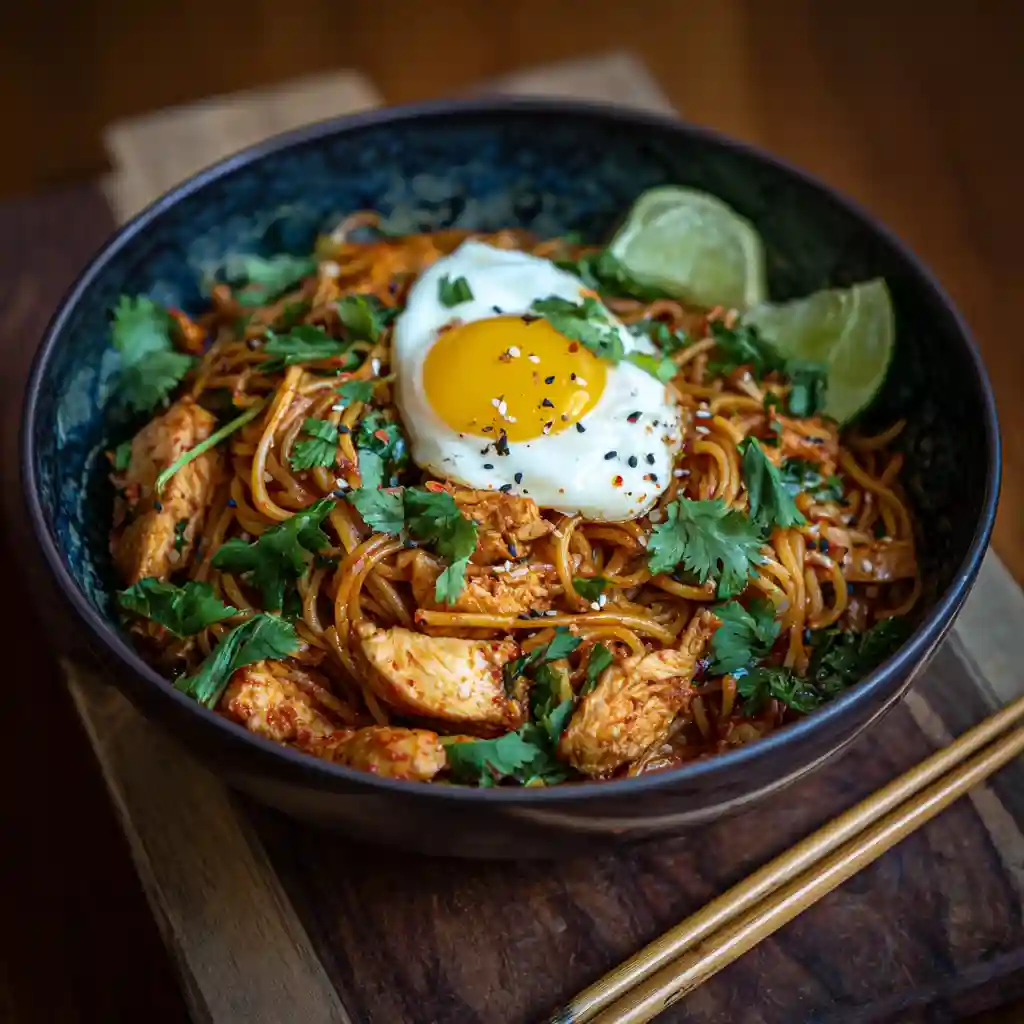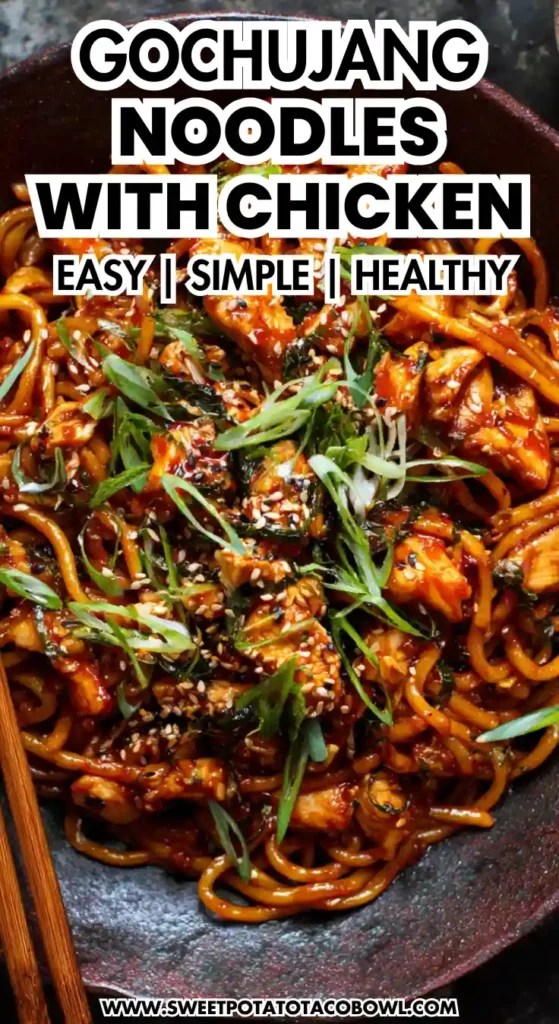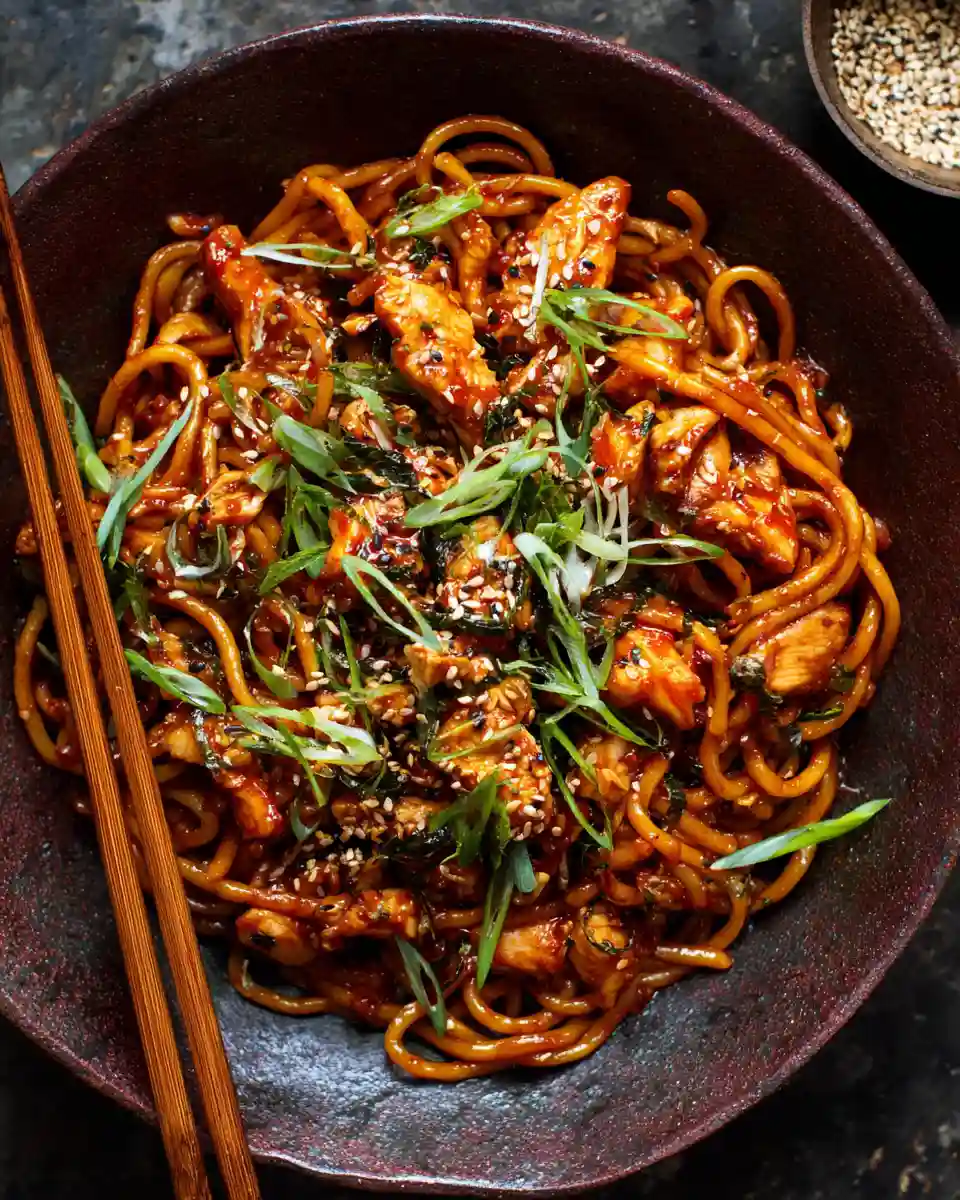Did you know that nearly 70% of home cooks feel intimidated by making authentic Korean dishes at home? If you’ve ever hesitated to try bold flavors because they seemed complicated or time-consuming, it’s time to change that.
Enter Saucy Gochujang Noodles with Chicken, a dish that perfectly balances spicy, savory, and slightly sweet notes in just five simple steps. This recipe challenges the belief that flavorful Korean cuisine demands hours in the kitchen. In fact, this quick and easy meal brings authentic taste right to your table while requiring minimal fuss.
In under 30 minutes, you can savor noodles coated in a rich, gochujang-infused sauce, paired with tender chicken strips. Whether you’re cooking for a weeknight dinner or a casual gathering, these noodles will become your go-to recipe for delivering punchy flavor with ease.

Ingredients List
To bring your Saucy Gochujang Noodles with Chicken to life, here’s what you’ll need:
- 8 oz (225g) dried wheat noodles or udon noodles – swap with rice noodles for a gluten-free option
- 2 boneless, skinless chicken breasts, thinly sliced
- 3 tablespoons gochujang (Korean chili paste) – adjust for heat preference or substitute with sriracha for milder spice
- 2 tablespoons soy sauce (low sodium preferred)
- 1 tablespoon sesame oil
- 1 teaspoon honey or agave nectar to balance heat and add subtle sweetness
- 3 cloves garlic, minced, fresh for bold aroma or garlic powder in a pinch
- 1 teaspoon grated fresh ginger, optional but highly recommended for a zesty kick
- 1 small carrot, julienned – add crunch and color
- 2 green onions, sliced thinly for garnish and a fresh bite
- 1 tablespoon toasted sesame seeds to sprinkle on top
- Optional: chopped cilantro or crushed peanuts for extra texture and freshness
This vibrant ingredient list combines bright colors, layers of umami, and textures that make every bite delightful. The suggested substitutions offer flexibility based on availability or dietary preferences, without compromising flavor integrity.
Timing
Here’s how the timing breaks down for your Saucy Gochujang Noodles with Chicken:
- Preparation time: 10 minutes
- Cooking time: 15 minutes
- Total time: 25 minutes
Compared to the average Korean noodle dish, which often takes 35 to 40 minutes, this recipe is about 35% quicker, making it perfect for busy evenings or last-minute cravings without compromising on taste.
Step-by-Step Instructions
Step 1: Prepare the Noodles
Bring a large pot of salted water to a boil and cook the noodles according to the package instructions, which typically range from 6 to 8 minutes. Drain and rinse under cold water to stop cooking and prevent sticking. Drizzle with a touch of sesame oil and toss gently. Set aside.
Pro Tip: Rinsing noodles in cold water keeps them springy and separates strands, ensuring every bite is perfectly saucy.
Step 2: Sauté the Chicken
Heat a large skillet over medium-high heat. Add a splash of sesame oil, then add sliced chicken breast. Season with a pinch of salt and pepper. Cook for 5 to 6 minutes until golden and cooked through. Transfer cooked chicken to a plate.
Pro Tip: Don’t overcrowd the pan, it helps achieve a nice sear and retains juiciness in the chicken.
Step 3: Build the Sauce
In the same skillet, reduce the heat to medium and add garlic and ginger. Sauté until fragrant (about 30 seconds). Mix in gochujang, soy sauce, and honey. Stir well to combine and create a glossy, thick sauce.
Pro Tip: Adjust the gochujang quantity to your spice tolerance; start with a smaller amount if you’re new to Korean chili paste and add more gradually.
Step 4: Incorporate Vegetables and Chicken
Add julienned carrots to the sauce, tossing for 2 minutes until slightly softened but still crisp. Return chicken to the skillet, stirring to coat evenly with the sauce.
Pro Tip: Adding veggies last ensures they maintain some crunch, enhancing texture contrast.
Step 5: Combine with Noodles and Serve
Add the prepped noodles into the skillet, tossing everything until noodles are fully coated in the rich sauce. Remove from heat, garnish with green onions, toasted sesame seeds, and optional cilantro or crushed peanuts.
Pro Tip: Serve immediately for best texture; noodles tend to clump if left standing too long.

Nutritional Information
One serving of Saucy Gochujang Noodles with Chicken (approximately 1/4 of the recipe) offers roughly:
- Calories: 400-450
- Protein: 35g
- Carbohydrates: 45g
- Fat: 12g (mostly healthy fats from sesame oil)
- Fiber: 4g
- Sodium: Moderate, adjustable by choosing low-sodium soy sauce
This dish is a great balance of macros, lean protein from chicken fuels muscle recovery, while fiber-rich noodles and veggies keep you full and energized. The capsaicin in gochujang may even slightly boost metabolism, according to nutrition studies.
Healthier Alternatives for the Recipe
- Swap wheat noodles for shirataki or zucchini noodles to reduce carbs and increase veggie intake.
- Use chicken thighs instead of breasts for more healthy fats and a richer flavor, if preferred.
- Replace honey with a natural, sugar-free sweetener, such as monk fruit, to lower the sugar content.
- Add extra greens, such as spinach or bok choy, to boost your intake of vitamins, minerals, and antioxidants.
- Use tamari or coconut aminos instead of soy sauce for a gluten-free, lower-sodium option.
These tweaks allow easy customization for keto, paleo, gluten-free, or vegan diets (vegan version: swap chicken for tofu and use vegan gochujang).
Serving Suggestions
- Serve with a side of pickled kimchi for an authentic Korean flavor contrast.
- Pair with a fresh cucumber salad tossed in rice vinegar and sesame seeds to cool down the palate.
- Garnish with lime wedges to add an extra citrus zing.
- For a heartier meal, accompany with steamed edamame or miso soup.
Offering these versatile options invites you to tailor your meal to any occasion, whether casual dinners or vibrant entertaining.
Common Mistakes to Avoid
- Overcooking noodles – this leads to a mushy texture that dulls the vibrant sauce. Always rinse and drain promptly.
- Using too much gochujang at once – start small with chili paste to avoid overwhelming heat.
- Crowding the pan when cooking chicken causes steaming instead of searing, resulting in less flavor.
- Skipping the honey/sweetener – this balances gochujang’s heat and prevents the dish from tasting overly spicy or bitter.
- Waiting too long to serve – noodles absorb sauce and thicken over time, losing their saucy consistency.
Following these key points ensures a flavorful, perfectly textured dish every time.
Storing Tips for the Recipe
If you have leftovers, store the noodles and chicken separately in airtight containers in the refrigerator for up to 3 days. Reheat gently in a skillet or microwave, adding a splash of water or broth to loosen the sauce, if necessary. Vegetables can become soft if stored for too long, so consider prepping fresh garnishes when serving again.
For meal prep, cook the chicken and veggies ahead of time and refrigerate. Prepare noodles fresh the day of serving for optimal texture.

Conclusion
With just five simple steps, your kitchen can transform into a Korean flavor haven featuring the irresistible Saucy Gochujang Noodles with Chicken. This recipe proves that bold, exciting dishes don’t have to be complicated or time-consuming. By balancing spicy, sweet, and savory elements, you’ll delight your taste buds and impress your family or guests alike.
Ready to try it yourself? Whip up this noodles recipe today and share your experience or photos in the comments. For more inspired Asian fusion recipes, explore our blog’s diverse collection and elevate your home cooking adventures instantly.
FAQs
Q1: Can I make this dish vegetarian or vegan?
A1: Absolutely! Replace chicken with firm tofu or tempeh, and use vegan-friendly gochujang. Increase veggies to enhance flavor and texture.
Q2: How spicy is this dish, and can it be adjusted?
A2: The spiciness largely depends on the amount of gochujang. Start with 1 or 2 tablespoons if sensitive to heat. You can always add more after tasting.
Q3: What noodles work best for this recipe?
A3: Wheat noodles or udon have the best chewy texture, but rice noodles and even soba can be great alternatives, depending on your preference or dietary needs.
Q4: Can I freeze leftovers?
A4: It’s not recommended to freeze as noodles can become mushy. Instead, refrigerate and consume within three days.
Q5: Is gochujang available in regular supermarkets?
A5: Yes, most well-stocked grocery stores carry gochujang in the Asian foods aisle. You can also find it easily online.


Leave a Reply